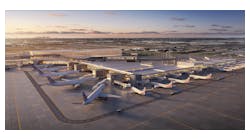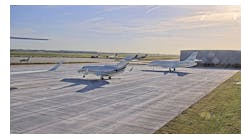Bangladesh, June 8 -- The Emirates Group released its second annual environment report recently expanding the scope from last year to include more data on Emirates locations outside Dubai as well as additional business areas of the Group.
The results show Emirates airline maintains its leading position in the industry in terms of fuel efficiency due to its young, technologically-advanced fleet, says a press release.
A key factor in the Group's environmental strategy, supported by the Boeing 777 order for an additional 50 aircraft in November 2011, is the airline's eco-efficient fleet which is at the cutting edge of fuel efficiency and environmental performance. With an average fleet age of only 6.4 years versus the global IATA average of 11.3 years, Emirates fuel efficiency results are 22.5% better than the IATA average and CO2 emissions are 18.1% better than the IATA average.
Emirates recognises that how an aircraft is flown can impact the environment. The airline has therefore partnered with various air navigation authorities around the world to test the most eco-efficient flight routings. One recent example featured in the report was Emirates participation in the INSPIRE Programme (Indian Ocean Strategic Partnership to Reduce Emissions). Emirates' three test flights resulted in a combined fuel savings of nearly 7 tonnes of fuel and 22 tonnes of CO2 emissions. This on-going work identifies potential fuel efficiency improvements and assists Emirates in future flight planning goals.
On top of initiatives and benchmarking of flight operations, the report recognizes the constant efforts and success of the Emirates Group employees over the 2011-2012 period, such as: Switching to lighter-weight Kevlar Cargo unit loading devices, saving 14,475 tonnes of fuel and 45,595 tonnes of CO2 emissions; Increasing frequency of engine washes by Emirates Engineering, saving an estimated 314 tonnes of fuel and 989 tonnes of CO2 emissions; Eliminating e-waste through recycling obsolete PCs, monitors, laptops, printers, and toner cartridges, saving around 5,800 items from landfills; Recycling over 33 tonnes of used clothing and shoes through staff donations, saving 40% more than the previous reporting year; and initiating a company-wide switch to recycled paper, saving approximately 1,700 trees, more than 400,000 kWh of electricity, 3.3million litres of water, and 250 tonnes of CO2 emissions. Published by HT Syndication with permission from The Financial Express.
Copyright 2012 The Financial ExpressAll Rights Reserved





